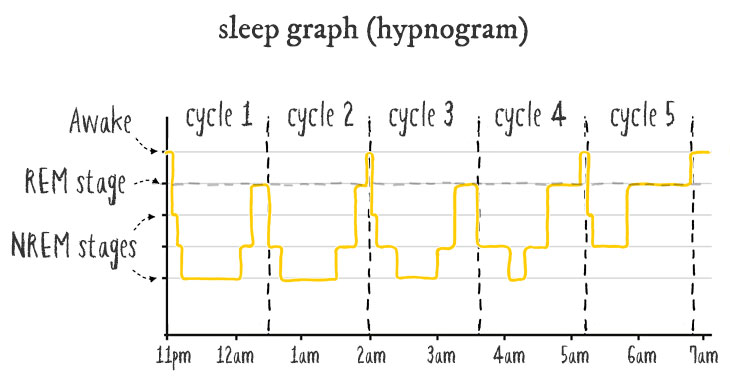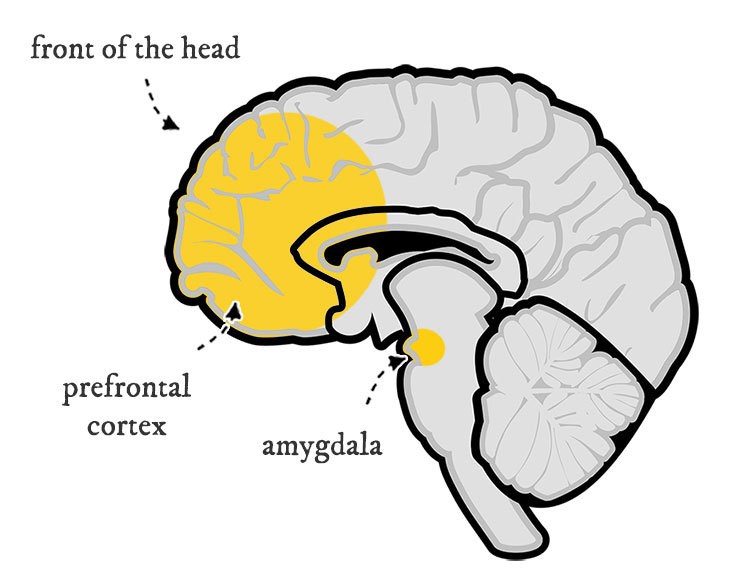Why Are Dreams So Emotional (The True Cause)

Dreams can be strange, vivid, and hallucinogenic. Full of movement and bizarre experiences.
But I think you’ll agree that our nighttime visions’ prominent feature is their highly charged emotions.
Many dreams evoke feelings of anxiety, sadness, or even fear.
But why are dreams so emotional?
It’s only recently that researchers have discovered the truth about why our dreams arouse such strong feelings.
Why do I have emotional dreams?
The reason our dreams are so emotional is that our brain activity is different while we sleep. In particular, during the stage when we dream, known as REM sleep. The emotional regions of the brain are highly active during this time.
During sleep, your patterns of brain activity are different from when you’re awake.
The sleeping brain cycles through two different phases. These are known as “NREM” and “REM” sleep.
- REM stands for “rapid eye movement.”
- NREM means “non-rapid eye movement.”
Note that dreams only occur during the REM phase of sleep.
Brain activity alternates from one phase to another during a typical night’s sleep about every 90 minutes. The resulting ebb and flow from one state to another occurs about 5 times per night.
So on average, everybody dreams five times each night.

This little “sleep graph” is known as a hypnogram. As you can see, the amount of time spent in REM sleep (and therefore the length of time spent dreaming) increases as the night progresses. We dream the most during the final stage of sleep, just before waking up.
But the interesting thing to note is what happens to our brain activity during the periods of rapid eye movement sleep.
Thanks to brain scans, researchers now know more about the internal processes of the brain when you dream, revealing why our dreamscapes involve intense emotions.
Two areas of the brain are noticeably modified during the dreaming phase. These are known as:
- The prefrontal cortex
- The amygdala
The prefrontal cortex is involved in logical thought and decision-making processes.
On the other hand, the amygdala is at the deep emotional center of the brain.

What happens during a dream is that the logical part of your brain becomes “deactivated.” Scans show that prefrontal activity is largely suppressed.
At the same time, the emotional circuits of your brain show a considerable increase in activity.
In fact:
“These emotional regions of the brain are up to 30 percent more active in REM sleep compared to when we are awake!” See Matthew Walker – “Why We Sleep.” (Amazon).
This helps explain why our dreams are so emotionally charged and full of strange events!
The emotional part of your mind, the amygdala, is overactive! While the logical brain circuits are pretty much switched off.
But dreams also affect our emotions in other vital ways…
Processing Emotions in Dreams
It’s now understood that dreams and sleep play an essential role in our overall psychological health.
Sleep helps consolidate memories from waking life. But, at the same time, we’ve discovered that:
“REM sleep recalibrates and fine-tunes the emotional circuits of the human brain” – Matthew Walker.
So the process of dreaming can help soothe the emotional impact of painful waking events. This readjustment of our emotional brain circuits makes us better equipped for our day-to-day social activities, particularly during emotionally stressful periods of our lives.
If you ever try to interpret the meaning of a dream, you should look for clues in your recent waking life.
This is because it’s been found that our dreams are often emotional responses to our daily activities.
In fact, according to studies by professor Robert Stickgold, between 35% and 55% of our emotional concerns resurface in our dreams – See Robert Stickgold – “When Brains Dream.”
As a result, any challenging events during the day might resurface in some symbolic form in your dreams.
But some people may experience even more emotionally intense dreams than others.
Here’s the reason why…
Intense Emotional Dreams

There may be another reason why you experience very intense emotions during dreams.
It depends on your personality.
Certain people tend to go through life “bottling up” their emotions. A lot of the time, we don’t give room for our feelings during the busy day.
It’s true…
A lot of daily situations force us to conceal our real feelings.
And people who learn that expressing their emotions can be dangerous have a greater fear of vulnerability.
This leads to an unhealthy tendency to suppress your feelings and hide emotions from others.
If this is the case, the painful moments of your waking life could be provoking more vivid dreams.
So are you the kind of person who suppresses their emotions?
Suppressed Emotions in Dreams
It’s not uncommon for suppressed emotions to show up in dreams.
In fact, psychological studies have shown that people who suppress their waking thoughts dream more about their difficult waking life experiences.
Your habit of consciously pushing uncomfortable thoughts aside could be an important reason you experience such highly charged emotional dreams.
Suppose you consciously avoid talking about awkward or embarrassing subjects. In that case, you are much more likely to “live out” the resulting inner conflicts in your dreams.
If you’re the kind of person who bottles everything up, this can strain your overall health.
Try to get better at expressing yourself.
Emotional Pain in Dreams

It’s not uncommon to feel sadness, fear, anxiety during REM sleep. The emotional pain in your dreams reflects the internal struggle between your conscious and unconscious self.
You may be living a complicated phase in your life, and your unconscious dreams are warning you to achieve a more balanced psyche.
Your psyche (the human mind, soul, and spirit) comprises both conscious and unconscious elements.
“The present state of our psyche is the result of our emotional self’s reactions to the experiences and situations that life has thrown at us.” Eric Ackroyd. “A Dictionary of Dream Symbols”.
Take the time to examine the painful symbols in your dream, and try to find the source of your inner conflict.
Aligning your conscious and unconscious mind should lead to greater happiness and fulfillment.
Can Dreams Make You Cry
Because of the emotional character of most dreams, if you experience extreme sadness during a dream, it is not uncommon to cry.
Some people may even wake up crying, jolted out of sleep by the emotional charge of the dream.
These kinds of dreams are quite common and are known as “cathartic dreams.”
They typically represent a desire to release pent-up emotions that you have repressed in waking life.
They can serve as a release to suppressed inner feelings.
No Emotions in Dreams
If you do not remember experiencing any emotions during your dreams, do not mistake this absence of feeling for true emotional numbness.
Just because your dream is ordinary doesn’t mean you lack emotions.
In fact, it’s probably a sign that you are living a reasonably psychologically balanced life.
Don’t worry, be happy!

